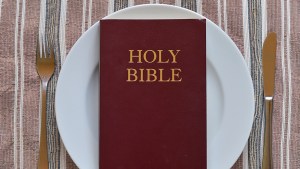In general, the Catholic Church doesn’t have many specifics when it comes to fasting. Lent includes two primary days of fasting, Ash Wednesday and Good Friday, while also instructing Catholics to abstain from meat on every Friday during Lent.
This is meant to provide Catholics with a certain amount of freedom to choose those disciplines that help them the most in their relationship with God. Often such Lenten disciplines are chosen with the help of a spiritual director or trusted priest.
St. Thomas Aquinas wrote more specific guidelines in his Summa Theologiae, first reflecting on the natural rhythms of the body as he saw them at his period in history.
As stated above, fasting is directed to the deletion and prevention of sin. Hence it ought to add something to the common custom, yet so as not to be a heavy burden to nature. Now the right and common custom is for men to eat about the sixth hour [12:00 noon]: both because digestion is seemingly finished (the natural heat being withdrawn inwardly at night-time on account of the surrounding cold of the night), and the humor spread about through the limbs … and again because it is then chiefly that the nature of the human body needs assistance against the external heat that is in the air, lest the humors be parched within.
The ninth hour
With this in mind, St. Thomas Aquinas argues that extending one’s fast another 3 hours — to the “ninth hour” (3:00 p.m.) — can be a suitable sacrificial act.
Hence, in order that those who fast may feel some pain in satisfaction for their sins, the ninth hour [3:00 p.m.] is suitably fixed for their meal. Moreover, this hour agrees with the mystery of Christ’s Passion, which was brought to a close at the ninth hour, when “bowing His head, He gave up the ghost” (John 19:30): because those who fast by punishing their flesh, are conformed to the Passion of Christ, according to Galatians 5:24, “They that are Christ’s, have crucified their flesh with the vices and concupiscences.”
This type of fasting isn’t a requirement of the Catholic faith, or something that everyone should adopt immediately into their life. Just as with any change in diet, you should consult your physician to see if your body can handle such a practice.
Aquinas’ suggestion reminds us that Lenten disciplines, such as fasting, should “hurt” a little bit. If it does, it unites us more closely to Jesus’ Passion, and reminds us of the great sacrifice that he made out of love for us.



